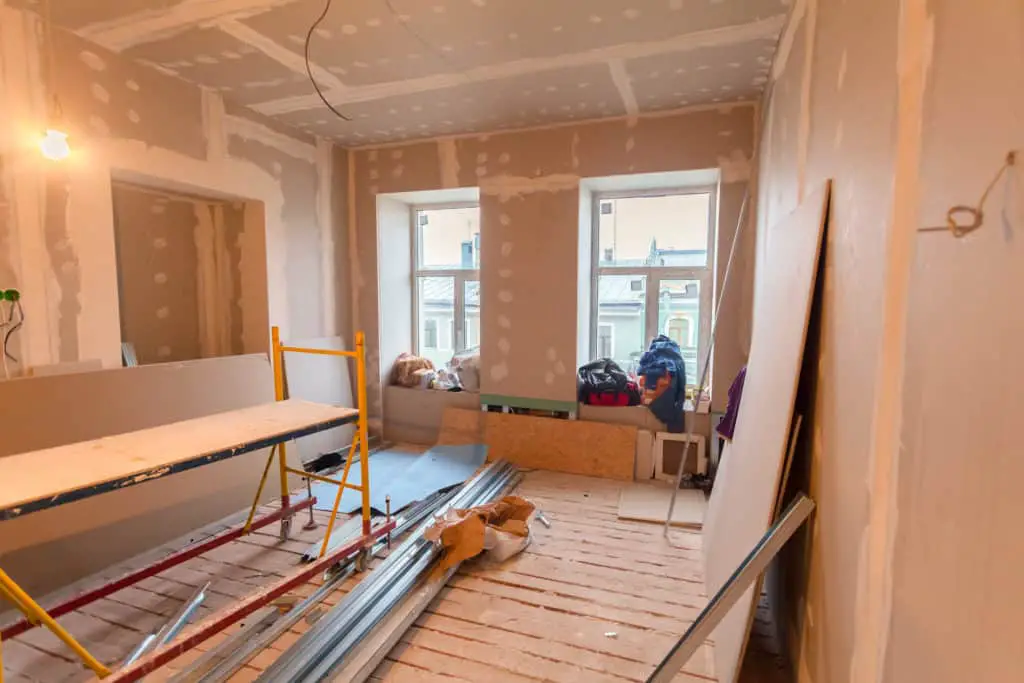I’m currently trying to get on the property ladder in my home town of Bristol. This means I’m spending far too many evenings sitting on the sofa playing the slightly depressing game of hunting Rightmove for a property within my price range.
In my hunt for an affordable first rung on the ladder, I’ve started looking at older properties that require a lot more work. My partner and I recently viewed a 1970s house where I overhead other perspective purchases questioning, does a 1970s house need a rewire?
We decided not to put an offer in on the house. Therefore as I now don’t have multiple nights of refurbishing work to do, I thought I should write a post discussing if 1970s houses need rewiring (just in case the potential purchasers we met went on to buy – they seemed like nice people after all).

Does a 1970s House Need Rewiring?
A 1970s house would likely benefit substantially from a rewire. Not only will the whole electrical system be upgraded to make it safer, but a rewire is also a great opportunity to add additional socket outlets which tend to be sparse in older properties.
Homes built in the 1970s will be a long way from complying with the latest wiring regulations. However it’s worth bearing in mind that the regulations change and update every couple of years so staying up to date with the very latest regs is an ongoing challenge even for modern properties.
The fact that the house is built in the 70s does not in itself mean it requires a full rewire although there are many benefits to choosing this option. A qualified electrician can carry out an Electrical Inspection Condition Report (EICR). After the inspection, older installations can still be signed off as working safely if the electrician carrying out the work does not find any faults.
It’s a bit like getting a car MOT. With an EICR, an electrician can pass an electrical installation as being safe for continued use, whilst still issuing advisories for its improvement. As long as there are no issues that cause an automatic fail (such as exposed live wiring) the installation is safe to continue using.
In a house of this age, there are likely to be many improvements advised such as a new fuse box (consumer unit), RCD protection, and upgraded bonding, the list tends to go on and on in a house of this age.
This is where it can often be beneficial to carry out a rewire as a blanket fix for all issues. Often sticking plasters over the injuries, by just upgrading the fuse box, or rewiring a couple of circuits, results in more aggravation down the road. Sometimes the best option is to carry out the major surgery in the beginning.
Ultimately, the only true way to know if your 1970s house needs a rewire is to hire an electrician to carry out the inspection and then have a discussion taking on board their expert opinion. Once the EICR has been completed it is up to the individual homeowner to decide how they would like to proceed.
Should I Get My 1970s House Rewired?
Deciding whether or not to get a house rewired is a big decision. Below are a few advantages and disadvantages to help homeowners decide if they should have the work done or opt for other smaller remedial options.
| Advantages | Disadvantages |
|---|---|
| A safer electrical installation | Cost (Usually around 2 – 4 thousand pounds) |
| Opportunity to add more socket outlets (especially behind TVs etc) | Highly disruptive |
| Easier to sell the house | Time-consuming deciding on new light fittings, socket choices etc |
| Able to decorate without fear of tearing down walls again | Will need to redecorate |
| Peace of mind | No guarantee you’ll see the money back when selling |
| Opportunity to hard wire internet to each room | |
| Opportunity to wire TV points to each room |
If an electrician has tested the property and recommended a rewire, their professional advice should be followed to ensure your home is safe and complying with building regulations. Discussions with the local electrician who has been to your home are the best way forward!
If carrying out a major renovation of a house this age, it makes perfect sense to get the wiring upgraded at the same time. Rewires are disruptive. There is no magic bullet when it comes to accessing cables buried within walls and under floors, the decoration needs to be disturbed even if the paint is still fresh.
It goes without saying that having a house rewired is a great idea and if the work could be done for free I’m guessing the majority of homeowners would jump at the chance. Unfortunately, despite the many benefits of having a rewire carried out, the cost and the disruption prevent many homeowners from choosing to have the work done.
I plan to do some research into grants available for low-income households to get their houses rewired for free or at lower costs, (which when complete will be linked here). Cost should not be a barrier to everyone living in an electrically safe home.
Is Rewiring a 1970s House Difficult?
Rewiring a house built in the 1960s or 1970s is no more difficult than rewiring a newer built home but has different challenges such as the fear of finding asbestos. In contrast, sometimes in houses this age, we get lucky and are able to reuse some of the containment hidden within the walls which creates less disruption.
The main difficulty when rewiring a house of this age range is the addition of many more socket outlets and switches. Modern living requires a much greater number of electrical gadgets than our friends in the 70s. More outlets spread out among the rooms require more wall chases.
When a 1970s house was initially constructed one or two socket outlets in the living room and bedrooms were the norm. Now most homeowners want multiple double sockets in each corner of the room, not to mention the additional ethernet ports and Arial points behind a TV in each room.
An Electrician is Recommending a Rewire, What Should I Do?
If an electrician has carried out a periodic inspection, also known as an electrical installation condition report, and advised that a rewire is required their advice should be followed to ensure safety within the home. Of course, a second or third opinion can be sought from another professional electrician.
In theory, if multiple electricians test the same property they should return the same results and the same recommendations. In reality, electricians are only human and have different ideas about how to fix problems. When we visit a doctor we trust what they have to say but occasionally patients decide they want to get a second opinion as the doctor is only human after all.
Deciding whether or not to get a second electrician’s opinion is a tricky one as it is obviously going to cost more money (around £200 for the inspection report) and the second or third opinion is likely to give the same feedback.
Where a rewire is an all-out-start-again approach to the wiring systems in the home, some electricians prefer the patch-up approach, such as rewiring only some circuits or changing the fuse box only. In today’s safety-conscious world I generally tend to favour a complete rewire as it is the safest option and prevents new problems from rearing their head a few months down the line.
Final Thoughts
The question, does a 1970s house need a rewire? is tricky to answer in the macro sense. Overall, yes a house built in the1970s will benefit substantially from having a rewire and would certainly be advisable if considering a renovation project.
However, just because something is old does not make it inherently unsafe. The only way to find out is to employ an electrician to carry out an inspection of the property and report their findings.
There are plenty of old cars on the road that would never be allowed to roll off the production line today because they don’t meet the latest safety standards. They are still allowed to be on the road today, as they meet the safety standards in relation to the year they were built. Whether or not you are comfortable taking your (and your family’s) safety chances and riding in the old car is something only you can decide.

